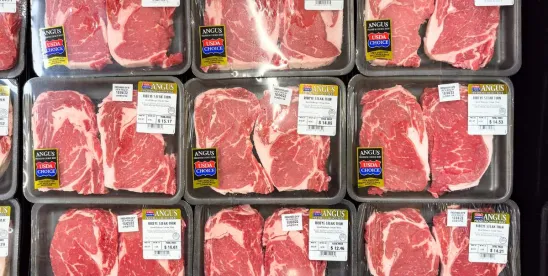In this blog, we have written a number of times on the topic of cultivated, i.e., lab grown meats. Last year, the FDA gave final regulatory approval for two different companies to sell their cultivated chicken in the United States. Over 100 different companies are working on various cultivated meats and, in Europe, several companies have begun seeking regulatory approval for their products. However, cultivated meat does face regulatory challenges beyond FDA (or similar national regulatory authority) approval. This blog previously reported on Italy banning the production and/or import of cultivated meat. The first ban on cultivated meat (and other cultivated animal products) in the United States was just recently enacted. On May 1, 2024, Governor Ron DeSantis signed a bill prohibiting the sale, holding or distribution of cultivated meat in the State of Florida. Governor DeSantis stated he wanted to “save our beef.” This was the first law of its kind in the United States, but several other states are also considering such bans.
The new Florida law makes it a misdemeanor to manufacture, sell or distribute cultivated meat in Florida. Restaurants, stores, or other businesses that violate the law could have their licenses suspended. The behind the new law, according to Florida Commissioner of Agriculture Wilton Simpson is to “protect our incredible farmers and the integrity of American agriculture.” The new Florida law (lines 1031- 1072) defines “cultivated meat” as “any meat or food product produced from cultured animal cells.” The Florida definition of “food” further includes “any food or drink for human consumption,” “chewing gum,” any component of any of those, as well as any dietary supplements or other items for which health claims are made.
While the new Florida law seems to be directed at “cultivated meat,” the language of the new law prohibits more than just cultivated meat. Instead, it prohibits any food product, including any component of any food product, produced from cultured animal cells. Meat is not the only cultured animal cell product that had been developed or is under development. Cell cultured milk products are also under development. Cell cultured milk could give rise to a full complement of dairy products, such as milk, cheese, cream, yogurt, etc. The current language of the Florida law would seem to also ban these types of products.
Several other states, specifically, Alabama, Arizona, and Tennessee are considering similar bans. Like the Florida law, proposed litigation in other states would ban not just cultivated meat, but also any foods made from cultivated animal cells. The proposed Alabama bill would ban “any food product produced from cultured animal cells.” However, because NASA is considering cultivated food products for space travel, the Alabama bill expressly permits federal, state, and local government entities, as wells as institutes of higher education, and those working with them to conduct research into the production of cultivated food products.
The Arizona bill would not only prohibit the production and sale of cultivated food products, but would add (1) a fine of up to $25,000 for violating the law, and (2) the ability for anyone adversely impacted by a violation of the law to sue the violator for damages, including attorneys’ fees and costs if successful. The Tennessee bill, in addition to prohibiting the sale, import and/or distribution of all cultivated food products, includes a provision under which violators of the proposed bill could be subject to a fine of up to $1,000,000 if the Agriculture Commissioner finds that the proposed law was violated.
As we have previously written, cultivated meat is gaining ground. However, the road to acceptance includes some regulatory roadblocks.



 />i
/>i

